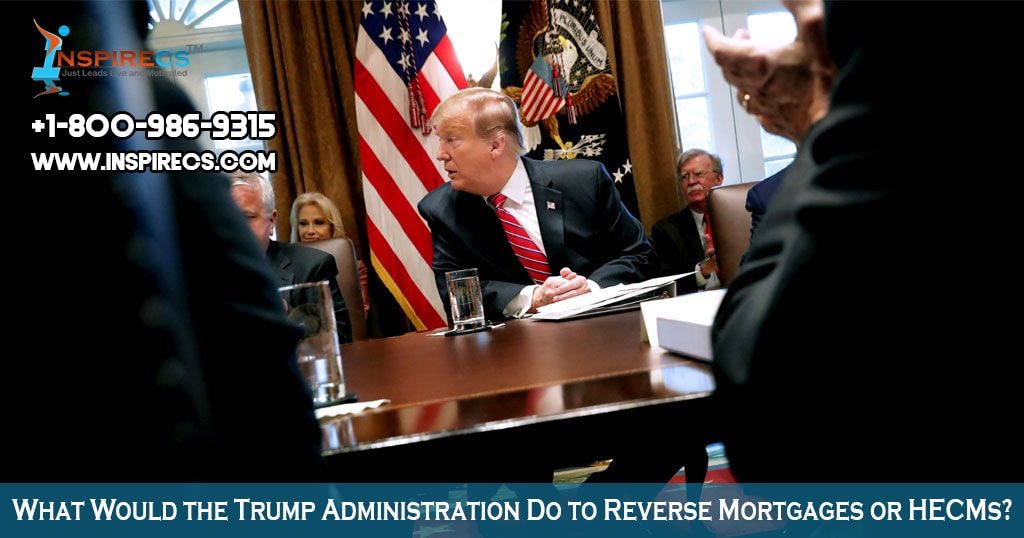
Reverse mortgages are among the best financial tools for senior homeowners who aspire to supplement their retirement income. In fact, reverse mortgages or HECMs are blessings for aged borrowers. Why so? Because borrowers aged 62 or above can convert home equity into cash and have multiple payback options such as a lump sum, monthly payments, or a line of credit. As these loans are insured by the Federal Housing Administration (FHA), changes in leadership and policy direction influence their future. Therefore, it is important to know “What would the Trump Administration do to reverse mortgages or HECMs?” So, let’s explore what the Trump administration’s policies could do to reverse mortgages and
The Trump Administration’s Financial Policy during the previous tenure
During his previous tenure, Donald Trump emphasized private market empowerment, economic growth, and deregulation. However, we observed that reverse mortgages were not at the forefront of his administration’s priorities. Moreover, his administration significantly reduced government involvement in housing finance. Despite that, it is important to understand that such initiatives often lead towards the reassessment of federally backed programs such as HECMs.
Major challenges associated with the HECM program
Before delving into what the Trump Administration would do to reverse mortgages or HECMs, it’s essential to understand the challenges associated with the HECM program.
- Firstly, the FHA’s MMI Fund’s financial stress caused by losses from the HECM program prompted calls for reforms.
- Secondly, several cases have surfaced where borrowers fail to meet property tax because of overwhelming other costs such as homeowner’s insurance, and maintenance obligations.
- Thirdly, borrowers often find the structure of reverse mortgages confusing, and that causes misunderstandings about terms and obligations.
What would the Trump Administration do to reverse mortgages or HECMs?
So, what possible actions or reforms Trump Administration might take or could take regarding HECMs? The following are some hypothetical future scenario we could see in the near future.
1. Tightened lending standards
The first one is quite obvious as Trump Administration would prefer to protect the MMI Funds by tightening strict lending standards. Strict financial assessments of borrowers and tightened eligibility criteria would definitely reduce the risk of default. Thus, the outcome would align with the administration’s priority regarding minimizing taxpayer exposure.
2. Adjustments to loan limits and fees
Trump’s administration might also modify HECM loan limits or increase upfront mortgage insurance premiums. Such measures would easily help in managing risk and bolstering the MMI Fund. However, the flip side would be but some borrowers would hesitate to participate in the program.
3. Privatization of reverse mortgages
Privatization of reverse mortgages is another possible but aggressive step could Trump’s administration take. The privatization of federally backed programs could encourage private lenders to start offering reverse mortgages. This is another feasible step that might reduce FHA’s risk exposure but at the cost higher costs for borrowers and less accessible terms.
Innovative alternatives to reverse mortgages
Innovative alternatives to reverse mortgages are another possible initiative. Trump’s administration could push for such innovations that would serve the same purpose as reverse mortgages and HECMs.
Broader political and economic context
Broader political and economic conditions would also influence the Trump administration’s approach to HECMs. For instance, a strong housing demand in the market would lead to reduced urgency to HECM reformation. Whereas, a downtrend of the demand would highlight vulnerabilities of the program. Additionally, reforming HECM program would also require support from other political parties.
Implications for senior homeowners
So what would be the implications for senior homeowners relying on reverse mortgages if Trump’s administration decided to reform HECM regulations? Undoubtedly, reforms would accompany both immediate and long-term implications such as:
- Increased premiums or privatization of HECM would significantly raise borrowing costs.
- Stricter eligibility, modified HECM loan limits, or increased upfront mortgage insurance premiums could exclude some seniors from the program.
Conclusion
Reverse mortgages have long been a superb financial instrument for retirees seeking financial freedom. Therefore, their sustainability through reverse mortgages or HECMs demands careful management. Whether Trump’s Administration goes for stricter regulations, privatization, or any other changes in the policy, senior borrowers would be greatly affected. Therefore, seniors considering a reverse mortgage need to stay informed about potential policy changes. Additionally, they should also seek professional advice.



